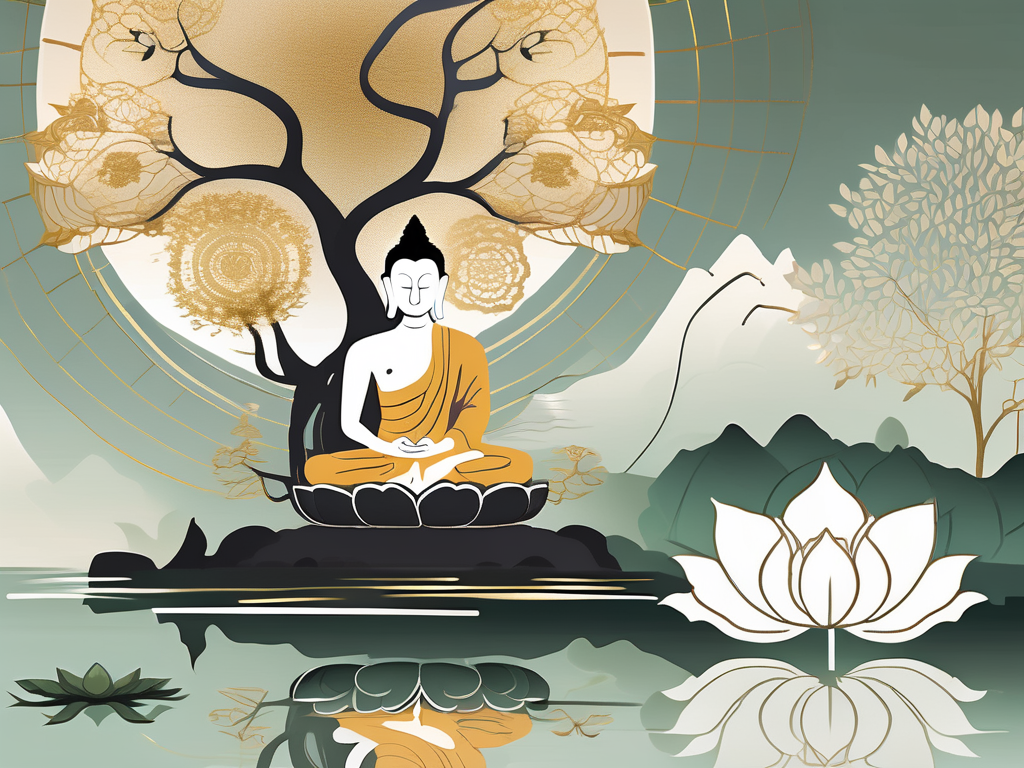Gender equality is a topic of great importance in today’s world. Many religions have their own unique views on this subject, and Buddhism is no exception. In this article, we will explore Buddhist perspectives on gender equality and how they have evolved over time.
Understanding the Buddhist View on Equality
From a Buddhist perspective, equality is not just a social or political concept, but a deeply spiritual one. Buddhism teaches that all beings are fundamentally equal in their potential for enlightenment. This means that gender, race, or any other external factors are ultimately irrelevant in the pursuit of spiritual awakening.
However, it is important to note that Buddhism acknowledges the existence of differences between individuals. These differences, however, should not be used to justify discrimination or the denial of basic rights. Instead, Buddhism encourages us to recognize the inherent dignity and worth of all beings, regardless of their gender or other characteristics.
In the pursuit of understanding the Buddhist view on equality, it is essential to delve deeper into the concept of equality in Buddhism. Rooted in the concept of interdependence, equality in Buddhism is intricately connected to the understanding of the interconnectedness of all beings. This fundamental tenet of Buddhist philosophy emphasizes that every action we take has the potential to affect others, and vice versa. By recognizing this interconnectedness, we are able to develop compassion and empathy for all beings, irrespective of their gender.
Furthermore, the concept of karma in Buddhism teaches us that our actions have consequences, including our attitudes and behaviors towards others. By cultivating a sense of equality and respect towards all beings, we can create positive karma that will lead to happiness and well-being. This understanding highlights the importance of practicing equality not only in our thoughts and beliefs but also in our actions and interactions with others.
The Concept of Equality in Buddhism
In Buddhism, the concept of equality extends beyond the realm of social and political structures. It is deeply rooted in the understanding of the interconnectedness of all beings and the recognition of their inherent worth. This recognition is not contingent upon external factors such as gender, race, or any other characteristics, but rather on the shared potential for spiritual awakening.
By embracing the concept of equality, Buddhists strive to create a society that is free from discrimination and prejudice. This involves treating all beings with respect and compassion, regardless of their differences. It also means actively working towards dismantling social structures that perpetuate inequality and injustice.
Moreover, the concept of equality in Buddhism extends beyond human beings. It encompasses all sentient beings, including animals and other forms of life. This understanding emphasizes the interconnectedness of all living beings and the responsibility to treat them with kindness and compassion.
Buddhist Teachings on Gender Differences
While Buddhism emphasizes the fundamental equality of all beings, it also recognizes the existence of gender differences. According to Buddhist teachings, these differences are a result of individuals’ past actions and karmic tendencies. However, it is important to note that these differences are not seen as hierarchical or indicative of one gender being superior to the other.
Buddhism teaches that both men and women have the potential to achieve enlightenment and contribute to the well-being of society. The teachings emphasize the importance of cultivating qualities such as wisdom, compassion, and mindfulness, which are essential for spiritual growth and the pursuit of enlightenment. These qualities are not limited to any particular gender but are accessible to all beings.
Furthermore, Buddhism encourages individuals to transcend gender identities and attachments. By recognizing the impermanence and fluidity of all things, including gender, Buddhists strive to cultivate a sense of freedom and liberation from societal expectations and limitations.
In conclusion, the Buddhist view on equality goes beyond mere social or political concepts. It is deeply rooted in the understanding of the interconnectedness of all beings and the recognition of their inherent worth. By practicing equality in thoughts, beliefs, and actions, Buddhists strive to create a society that is free from discrimination and prejudice, embracing the potential for spiritual awakening in all beings.
The Role of Women in Traditional Buddhism
Historically, women in traditional Buddhist societies have faced certain challenges and limitations. However, it is important to recognize that these limitations were often cultural and not inherent to Buddhist teachings themselves.
While women in traditional Buddhist societies may have encountered obstacles, their contributions to the religion cannot be overlooked. Throughout history, women have played important roles in the spread and preservation of Buddhist teachings, leaving a lasting impact on the faith.
Women in Buddhist Scriptures
In Buddhist scriptures, we find examples of women who not only embraced Buddhism but also played crucial roles in its development. One such remarkable woman is Mahaprajapati Gotami, the Buddha’s stepmother. After the death of her husband, she approached the Buddha and fearlessly requested permission for women to be ordained as nuns.
Initially, the Buddha hesitated to grant her request. However, after being persuaded by Ananda, one of his closest disciples, he eventually relented. This pivotal moment in history marked the beginning of the ordination of women in Buddhism, thanks to the determination and courage of Mahaprajapati Gotami.
The story of Mahaprajapati Gotami serves as a testament to the important role women have played in Buddhism throughout history. Despite the challenges they may have faced, women have made valuable contributions to the development and transmission of Buddhist teachings.
Historical Female Figures in Buddhism
Aside from Mahaprajapati Gotami, there are many other notable female figures in Buddhist history who have left an indelible mark on the faith. One such figure is the revered nun Patacara, known for her exemplary moral conduct and wisdom.
Patacara’s life was marked by personal tragedy, as she lost her entire family in a series of unfortunate events. Despite these hardships, she found solace in Buddhism and dedicated her life to the practice. Through her unwavering determination and resilience, Patacara not only overcame her own suffering but also became a respected teacher in the Buddhist community.
These stories of Mahaprajapati Gotami and Patacara exemplify the strength and resilience of women in Buddhism. They demonstrate that women have always had a place in Buddhism, despite the challenges they may have faced. Their contributions serve as an inspiration for all Buddhists, regardless of gender, reminding us of the importance of equality and inclusivity within the faith.
Modern Buddhism and Gender Equality
In recent decades, there has been a growing recognition within the Buddhist community of the importance of gender equality. Many Buddhist practitioners and scholars have been actively working to promote a more inclusive and egalitarian understanding of Buddhism.
Buddhism, with its emphasis on compassion and non-violence, provides a fertile ground for discussions on gender equality. The teachings of the Buddha emphasize the inherent worth and dignity of all beings, regardless of their gender. This fundamental principle has inspired many Buddhist teachers and organizations around the world to work towards ensuring that women have equal access to educational and leadership opportunities within the Buddhist community.
Contemporary Buddhist views on gender have evolved to reflect the changing social and cultural landscape. There is an increasing emphasis on the equality of all beings, regardless of gender. This shift in perspective has led to a reevaluation of traditional gender roles and expectations within Buddhist communities.
Contemporary Buddhist Views on Gender
In contemporary Buddhism, there is an increasing emphasis on the equality of all beings, regardless of gender. Buddhist teachers and organizations around the world are working to ensure that women have equal access to educational and leadership opportunities within the Buddhist community.
Moreover, contemporary Buddhist scholars and practitioners recognize the need to challenge and dismantle patriarchal structures that may exist within traditional Buddhist institutions. This includes addressing issues such as gender bias and discrimination. By acknowledging and actively working to dismantle these structures, the Buddhist community is taking important steps towards creating a more inclusive and equitable environment for all practitioners.
Efforts to promote gender equality in Buddhism are not limited to the institutional level. Many individual practitioners are also actively engaging with the teachings to explore and challenge their own biases and assumptions about gender. This personal reflection and growth contribute to the broader movement towards gender equality within the Buddhist community.
The Impact of Feminism on Buddhism
Feminist movements have had a significant impact on contemporary Buddhism. Feminist scholars and practitioners have brought attention to gender inequality within Buddhist traditions and have advocated for change.
As a result of these efforts, there has been a greater awareness of the need to integrate feminist perspectives into Buddhist teachings and practices. This integration has led to a more nuanced and progressive understanding of gender within the Buddhist community.
Feminist perspectives have challenged traditional notions of gender roles and have encouraged a more inclusive and egalitarian approach to Buddhist practice. This has resulted in a greater emphasis on the empowerment of women within Buddhist communities, as well as a recognition of the diverse experiences and identities of all practitioners.
Furthermore, the intersectionality of feminism and Buddhism has led to a deeper exploration of the ways in which gender intersects with other forms of oppression, such as race, class, and sexuality. This intersectional approach has enriched Buddhist teachings and practices, allowing for a more comprehensive understanding of the complexities of human experience.
In conclusion, the movement towards gender equality within Buddhism is an ongoing and dynamic process. Buddhist practitioners and scholars continue to engage with these issues, seeking to create a more inclusive and equitable community. By challenging patriarchal structures and integrating feminist perspectives, Buddhism is evolving to reflect the changing needs and aspirations of its practitioners in the modern world.
Challenges and Controversies in Buddhist Gender Equality
Despite the progress that has been made, challenges and controversies still exist with regards to gender equality within Buddhism.
When examining the debates surrounding the ordination of women as nuns (bhikkhunis), it becomes evident that this is an ongoing issue within Buddhism. In some Buddhist traditions, women are not fully recognized as equal to male monastics. This discrepancy has sparked intense discussions and calls for greater recognition and support for female monastics.
The debate on the ordination of women has been a contentious topic, with different viewpoints and interpretations of Buddhist scriptures. Some argue that the Buddha himself allowed for the ordination of women, while others believe that the lack of female monastic lineage makes it impossible to fully establish the legitimacy of female ordination. These debates highlight the complexities and differing perspectives within the Buddhist community.
Gender discrimination remains a significant challenge in certain Buddhist societies. Despite the teachings of compassion and equality, there is still widespread gender inequality, with women facing barriers to education, employment, and leadership positions. This discrimination not only hinders the progress of women but also contradicts the fundamental principles of Buddhism.
Efforts are being made to address these inequalities and promote a more equal and inclusive society. Buddhist organizations and activists are working towards empowering women and challenging traditional gender roles. They advocate for equal access to education, opportunities, and leadership roles for women, aiming to create a more balanced and just society.
Moreover, some Buddhist communities are actively engaging in dialogue and introspection to challenge and transform patriarchal structures. They are reexamining traditional interpretations of Buddhist texts and teachings to promote gender equality and social justice. These efforts are essential in fostering a more inclusive and progressive Buddhist community.
It is crucial to recognize that the challenges and controversies surrounding gender equality in Buddhism are not unique to this religion alone. They reflect broader societal issues and the struggle for gender equality that exists in various cultures and religions worldwide. By addressing these challenges head-on, Buddhism has the potential to become a powerful force for promoting gender equality and social justice.
The Future of Gender Equality in Buddhism
Despite the challenges that exist, there are reasons to be optimistic about the future of gender equality in Buddhism.
Progressive Movements within Buddhism
There are progressive movements within Buddhism that are actively working to promote gender equality. These movements prioritize inclusivity and advocate for equal opportunities for all practitioners, regardless of gender.
The Role of Western Buddhism in Promoting Gender Equality
Western Buddhism has played a significant role in promoting gender equality within the Buddhist community. Western practitioners have been at the forefront of efforts to challenge gender stereotypes and promote a more inclusive understanding of Buddhism.
As Buddhism continues to evolve and adapt to the changing times, it is crucial that gender equality remains a central concern. By recognizing the fundamental equality of all beings and working towards the elimination of gender discrimination, Buddhism can become a powerful force for positive change in society.












